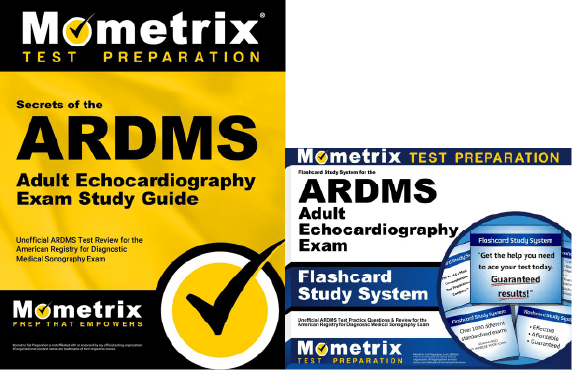If you need help studying for the ARDMS Adult Echocardiography (AE) exam or just want some more information about what the exam is like, you’ve come to the right place.
Click below to take a free ARDMS Adult Echocardiography practice test!
Exam Eligibility
Before you can register to take the ARDMS AE exam, you’ll have to meet at least ONE of the prerequisites below:
Prerequisite 1
Allied Health Pathway
You need to complete a two-year allied health education program in a patient-care field.
Experience
You need at least 12 months of full-time ultrasound/vascular experience.
Prerequisite 2
Accredited Sonography Graduate Pathway
You need to be a graduate from or student of a CAAHEP/CMA/HSO-accredited ultrasound/vascular program.
Experience
No additional experience required.
Prerequisite 3A
Degree with Clinical Experience Pathway
You need to have a bachelor’s degree in any major.
Experience
You need at least 12 months of full-time ultrasound/vascular experience.
Prerequisite 3B
Degree in Sonography Pathway
You need to be a graduate from or student in a bachelor’s degree program specifically in sonography or vascular technology.
Experience
No additional experience required.
Prerequisite 4
Physician Pathway
You need to have an MD, DO, or MBBS degree.
Experience
You need to have at least 500 ultrasound/vascular cases over at least 6 months.
Prerequisite 5
Cross-Credentialing Pathway
You need to have an active credential in RCS, RCCS, RVS (CCI), Sonography/Vascular/Breast Sonography (ARRT), or CRGS, CRCS, CRVS (Sonography Canada).
Experience
You’ll have met the necessary clinical experience through your credentialing organization.
If you meet the requirements within one of these pathways, you’re set to begin the registration process!
What’s on the Exam?
There are 150 questions on the exam, which are grouped into five domains, and the time limit is 3 hours (this includes a 5-minute survey).
Let’s take a closer look at the different sections of the Adult Echocardiography exam.
1. Anatomy and Physiology
15% of the exam
- Great vessels
- Cardiac anatomy and normal variants
- Pericardium
- Valve structure
- Vessels of arterial and venous return
- Normal response to stress testing
- Normal systolic and diastolic function
- Left ventricular strain patterns
- Normal valve function
- Phases of the cardiac cycle
2. Pathology
40% of the exam
- Congenital heart defects
- Connective tissue disorders
- Aortic and sinus of Valsalva abnormalities
- Aortic valve pathology
- Mitral valve pathology
- Pulmonic valve pathology
- Tricuspid valve pathology
- Ischemic cardiac diseases
- Arrhythmias and conduction disturbances
- Endocarditis
- Pericardial disease
- Cardiac masses
- Valve repair/replacement
- Abnormal diastolic function
- Abnormal systolic function
- Abnormal left ventricle
- Abnormal left ventricle using strain
- Segmental wall motion abnormalities
- Cardiomyopathies
- Abnormal right ventricle
- Abnormal pulmonary artery
- Abnormal arterial and venous return
- Structure and function of atria
- Septal defects
- Intracardiac devices
- Post-surgical procedures for congenital heart diseases
3. Clinical Care and Safety
11% of the exam
- Evaluating patient history and incorporating outside data
- Preparing and monitoring the patient
- Communicating critical findings
- Universal precautions
- Proper equipment cleaning and maintenance
- Relative and absolute contraindications for echocardiographic procedures
- Managing medical emergencies
4. Measurement Techniques, Maneuvers, and Sonographic Views
25% of the exam
- Aortic valve
- Mitral valve
- Pulmonic valve
- Tricuspid valve
- Parameters of diastolic function
- Great vessels and veins
- Atria
- Ventricles
- Pulmonary artery pressure
- Shunt ratios
- Provocative maneuvers
- Apical views
- Parasternal views
- Subcostal views
- Suprasternal notch views
- 2D and 3D transesophageal echocardiogram images for valve assessment
5. Instrumentation, Optimization, and Contrast
9% of the exam
- Imaging artifacts
- Non-imaging transducer
- Console settings to achieve optimal Doppler recording
- Console settings to achieve optimal imaging display
- Recognizing critical findings and pathology on transesophageal echocardiogram
- Ultrasound enhancing agents
How to Register
Once you’ve ensured that you meet all of the eligibility requirements, you can register for the exam.
To get started, you’ll need to submit an application on the ARDMS website. The application will ask you for your contact information and any documentation to prove your eligibility (among other things).
When you submit the application, you’ll also need to submit the testing fee, which is $275.
Exam Scores
The test is scored using a scaled scoring method. Here’s how it works:
For every question you answer correctly, you get one point added to your raw score. At the end of the test, your final raw score will be converted to a scaled score. This scaled score will range somewhere between 300 and 700.
The reason your raw score is converted to a scaled score is because everyone who takes the test is given a slightly different set of questions. Since everyone has a different arrangement of questions, and because some questions are harder than others, converting your raw score to a scaled score ensures a more even playing field.
Retaking the Exam
If you didn’t get a passing score on your first try, that’s okay! You can retake the test after a 60-day waiting period.
Keep in mind that you will have to pay the full testing fee every time you retake the test.
FAQs
How many questions are on the Adult Echocardiography exam?
The exam contains 150 questions.
What is the time limit for the Adult Echocardiography exam?
The exam is timed at 3 hours.
What is the passing score for the Adult Echocardiography exam?
You’ll need to get a final scaled score of at least 555 to pass.
How much does the Adult Echocardiography exam cost?
The testing fee is $275.



 ARDMS AE Study Guide
ARDMS AE Study Guide ARDMS AE Flashcards
ARDMS AE Flashcards